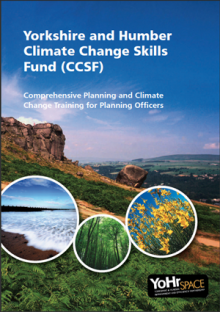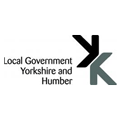News
Climate Change Training for Planning Officers

This free training package is designed to enhance the skills planning officers need to take positive action on climate change and increase local authority capacity to tackle causes and effects.
The training is free of charge to relevant local authority officers and qualifies as CPD for planning officers.
- Download the flyer 'Comprehensive Planning and Climate Change Training for Planning Officers' (pdf)
The training is organised into 10 modules:
- Introduction to climate change policy and context. This module aims to provide planners with a clear understanding of the relevant UK and EU climate change policy context and how the LDF/Local Plan fits within this framework. As a broad contextual module for the whole series, this module will be aimed at all planning policy, development management, conservation, sustainability, monitoring, and
building control officers. - LDF/plan making evidence base and Implementation of the Yorkshire and
Humber Renewable and Low Carbon Energy Study, 2011. This module will be designed to help planners use evidence to craft development policies and identify what evidence is required. It will aim to show officers examples of proportionate and cost effective evidence for climate change policies. The module will show officers
how to use the information in the Yorkshire and Humber Renewable and Low Carbon
Energy Study to set and implement local renewable energy targets and policies in the
LDF/Local Plan. This module will be principally aimed at planning policy officers, but will also be beneficial to sustainability officers and development management officers. - Development Policy Development and Supplementary Planning Documents
for Renewable Energy. This module will be designed to ensure planners are confident they can design clear, specific, and robust advice to secure Renewable Energy through Development Policies and SPD’s. Officers will learn from best practice examples of successful and up-to-date policies and documents.
This module will be principally aimed at planning policy officers, but will also be
beneficial to development management and sustainability officers. - Development Policy Development and Supplementary Planning Documents
for Construction. This module will be designed to ensure planners are confident they can design clear, specific, and robust advice to secure appropriate construction for climate change through Development Policies and SPD’s. Officers will learn from best practice examples of successful and up-to-date policies and documents. It is anticipated that this module would be principally aimed at planning policy officers, development management and sustainability officers but may also be of interest to building control and conservation officers. - Development Policy Development and Supplementary Planning Documents
for Green Infrastructure. This module will be designed to ensure planners are confident they can design clear, specific, and robust advice to secure green infrastructure for climate change through Development Policies and SPD’s. Officers will learn from best practice examples of successful and up-to-date policies and documents. This module will be principally aimed at planning policy officers, development management, landscape architects and sustainability officers. - Achieving climate change mitigation and adaptation in masterplanning. This module will help to ensure that planners are confident at all stages of the
masterplanning process in relation to climate change adaptation and mitigation. It will
focus on the big issues and aims to show planners how they can achieve so much more than just a strategy for use of micro technologies. Regional examples of best practice will inspire and encourage officers for example on what is possible for achieving CHP as a source of renewable energy on development opportunity sites.
This module will be principally aimed at development management, regeneration,
design, planning policy and sustainability officers. - Achieving climate change mitigation and adaptation in small scale development. This module will help give planners an understanding of the role that small scale developments can play in achieving renewable energy potential through microgeneration and cumulative carbon impacts and will help to give planners a clear understanding of the principles of sustainable design and retrofitting.
This module will be principally aimed at development management, design and
planning policy officers, but will also be beneficial to conservation and sustainability
officers. - Climate Change and viability. This module will aim to show officers how to challenge and assess financial information in relation to climate change proposals and will demonstrate the cost effectiveness of sustainable design, and renewable and low carbon measures. This module will be principally aimed at development management, regeneration and planning policy officers.
- Historical Assets and Climate Change. This module will emphasis to planners how they can strike the balance of contribution to climate change mitigation and fulfilling the requirements of conservation by managing the historic environment. This module will be aimed at conservation design and building control officers but will also be beneficial to sustainability, planning policy and development management officers.
- Regulation regimes, likely policy changes and implications for planning
requirements, monitoring and enforcement. This module will show planners how to implement policy requirements which is often seen as a great difficulty. This module will be aimed at monitoring, building control, and development management officers but would be beneficial to policy, sustainability and conservation officers.
For further details on this service please contact Ruth Hardingham on ruth.hardingham@lgyh.gov.uk or 07917554902.
You may have found us by using the following keywords: Our Climate, Climate Change Partnership, Climate Change, Regional, Adaptation Sub-Group, Adaptation, Local Authorities, Strategy and Monitoring, Built Environment, Transport, Health Services, Business, Land Management, Citizen Engagement, Energy, Waste, Water, Carbon, Flood risk, Mitigation, Leadership, Low Carbon Products, Low Carbon Services, Zero Carbon, Integrated Regional Strategy, Yorkshire and Humber Strategy, Climate Change Act, Regional Adaptation Study, Climate Change Plan for Yorkshire and Humber, Climate UK, Regional Coordinator, Low Carbon Economy, Bio-mass, Carbon Capture, Microgeneration, Local Area Climate Change Network, YoHr Space, Climate Change Board, Impacts, Vulnerability, Opportunities, CO2, NI188, NI186, NI185, NI187, Temperature, Rainfall, Extreme weather






